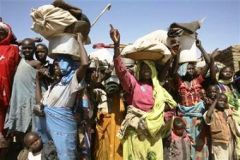World must protect Darfur civilians – UN team
March 12, 2007 (GENEVA) — The Sudanese government has orchestrated war crimes and crimes against humanity in Darfur and resisted international attempts to intervene, according to a report Monday from a high-level U.N. human rights team that was itself barred from the restive region by Sudanese officials.
 The team, headed by Nobel peace laureate Jody Williams, urged stronger U.N. Security Council intervention, sanctions and criminal prosecution.
The team, headed by Nobel peace laureate Jody Williams, urged stronger U.N. Security Council intervention, sanctions and criminal prosecution.
Reached by telephone at her Virginia home on Monday pressed the U.N. to move decisively protect “the people you said you’d protect.”
“If you’re not prepared to act on what you say, don’t say it,” she said.
Sudan’s government “has manifestly failed to protect the population of Darfur from large-scale international crimes, and has itself orchestrated and participated in these crimes,” according to the report to the U.N. Human Rights Council, which had commissioned it in an emergency session last December.
German Foreign Minister Frank-Walter Steinmeier, representing the EU at the council, said the world would have to act on the report’s description of “the ongoing, cruel human rights abuses”
“The international community won’t remain silent,” Steinmeier told The Associated Press.
“War crimes and crimes against humanity continue across the region,” the 35-page report said. “The principal pattern is one of a violent counterinsurgency campaign waged by the government of the Sudan in concert with janjaweed militia, and targeting mostly civilians. Rebel forces are also guilty of serious abuses of human rights and violations of humanitarian law.”
The report said important steps have been taken by the international community, including the African Union and the United Nations, but “these have been largely resisted and obstructed, and have proven inadequate and ineffective.”
The team said the U.N. Security Council should deploy the proposed U.N.-African Union peacekeeping force and provide full support to the International Criminal Court.
Prosecutors at the International Criminal Court in The Hague, Netherlands, last month linked Sudan’s government to atrocities in Darfur, naming a junior government minister as a war crimes suspect who helped recruit, arm and bankroll the desert fighters known as the janjaweed.
“All U.N. Security Council and AU Peace and Security Council resolutions should be fully implemented, including those relating to travel bans and the freezing of funds, assets, and economic resources of those who commit violations,” it said.
It said rape was widespread across Darfur, but that Sudanese authorities were doing little to prevent it or investigate the crimes.
“Arbitrary arrest and detention in Darfur by government security forces continue,” the report said, adding that there had been a wave of arrests of Darfuris in the Sudanese capital Khartoum in recent months.
There also have been curbs on free speech and “credible information on torture, inhumane and degrading treatment by national Security and Military Intelligence during attacks and in the treatment of detainees.”
Anti-government rebels were also to blame for human rights abuses including the rape and torture of civilians, the report said. Much of this violence was related to fighting between different rebel groups and an increase in violent banditry in the largely lawless region, it said.
In the telephone interview, Williams said there had been undue pressure on her team by some states in the council to balance criticism of Khartoum with similar criticism of the rebel groups.
“To recognized that the rebels have violated human rights in perfectly fine. But to say that they are on the scale of Khartoum and janjaweed militia is absurd,” Williams said.
Williams said in a letter to Ambassador Luis Alfonso de Alba of Mexico, the council’s president, that the Sudanese government had “consistently refused” to cooperate with her and her team, even after an appeal by U.N. Secretary-General Ban Ki-moon.
Although the team was unable to enter Sudan, it held numerous consultations with a wide range of aid agencies working in the region and was also briefed by officials of the African Union in Addis Ababa, the report said.
In Ndjamena, Chad, the team also spoke to some members of rebel groups and to Darfur refugees in Eastern Chad.
More than 200,000 people have been killed and some 2.5 million people have fled their homes since violence broke out in the region between government-backed janjaweed militia and ethnic African groups in 2003.
(AP)
The full text of the report : Report of the High-Level Mission on the situation of human rights in Darfur pursuant to Human Rights Council decision S-4/101.
